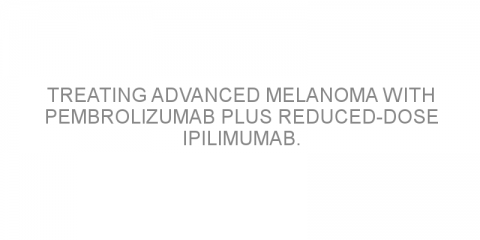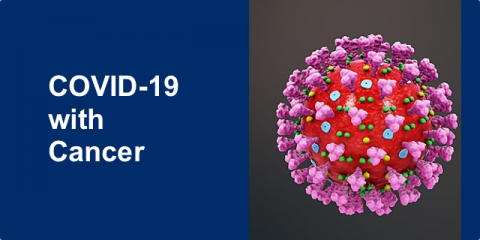In a nutshell This study was carried out to determine whether combination therapy with a standard-dose pembrolizumab (Keytruda) plus reduced-dose ipilimumab (Yervoy) could be used as a treatment option in patients with advanced melanoma. The study found that this combination had good outcomes and manageable side effects in...
Read MoreMelanoma Posts on Medivizor
COVID-19 with Cancer
Recent research presented at a virtual meeting of the American Association for Cancer Research 1 indicates the need for greater care and continued social distancing for those who are in treatment for cancer and – in one study that was presented – those who have a recent history of cancer (the research looked at people from 2015 to the...
Read MoreTreating BRAFV600 mutation-positive advanced melanoma with atezolizumab, vemurafenib, and cobimetinib
In a nutshell The study evaluated whether the combination of atezolizumab (Tecentriq), vemurafenib (Zelboraf), and cobimetinib (Cotellic) or AVC can effectively treat patients with BRAFV600 mutation-positive advanced melanoma (AM). The authors found that this combination was safe and effective as an initial treatment in such...
Read MoreEvaluating immune-related side effets in patients with advanced melanoma treated with immunotherapies
In a nutshell The study monitored the occurrence of possible immune-related side effects (irSEs) in patients with advanced melanoma under single and combination therapy of ipilimumab (I; Yervoy), nivolumab (N; Opdivo), and pembrolizumab (P; Keytruda). The authors found that combination therapy increases the frequency of irSEs. Some background...
Read MoreHow does COVID-19 affect patients with cancer undergoing chemotherapy?
In a nutshell This study examined how COVID-19 infection affects patients with cancer undergoing chemotherapy and the role of other factors in COVID-19 complications. The results showed that patients with advanced age and other medical conditions had a higher risk of COVID-19 complications but chemotherapy treatment did not need to be...
Read MoreCan biological therapies nivolumab and ipilimumab prevent stage IV melanoma from returning?
In a nutshell This study examined if biological therapies nivolumab (Opdivo) and ipilimumab (Yervoy) could safely prevent cancer return in patients with stage IV melanoma that has been surgically removed. The results showed that nivolumab and ipilimumab were effective at preventing recurrence but nivolumab alone was safer for patients. Some...
Read MoreHow common are allergic reactions to different biological therapies in patients with advanced melanoma?
In a nutshell This study compared the frequency of allergic reactions to different doses of three biological therapies in patients with advanced melanoma. The authors found that different doses of the three drugs reduced the number of allergic reactions. Some background Biological therapy has significantly improved treatment results for patients...
Read MoreWhat side effects of the skin can biological therapy cause?
In a nutshell This article reviewed the skin side effects caused by anti-PD-1 biological therapy. Some background Anti-PD-1 is a type of biological therapy that has significantly improved treatment results for patients with certain types of cancer. It works by blocking PD-1, a molecule that cancer cells use to switch off the immune...
Read MoreWhat biological therapies are recommended for patients with different types of melanoma?
In a nutshell This article reviewed biological therapies for patients with melanoma based on which type of disease they have. Some background Patients with melanoma are often treated with surgery to remove tumors first. In some cases, this is not enough. In other cases, patients have inoperable tumors. These patients are offered...
Read MoreWhat gut-related side effects do immunotherapy drugs and chemotherapy cause patients with cancer?
In a nutshell This study examined if certain immunotherapy drugs increased the risk of developing side effects in the gut in patients with cancer also receiving chemotherapy. The results showed that immunotherapy drugs increased the risks of developing gut-related side effects compared to chemotherapy alone. Some background...
Read MoreWhat types of skin-related side effects do biological treatments cause in patients with melanoma?
In a nutshell This article reviewed the types and frequency of different skin-related side effects that patients with melanoma experience while receiving biological treatments. Some background Treatment for patients with melanoma has changed in recent years from chemotherapy to biological therapies. Biological therapies include BRAF inhibitors...
Read MoreReviewing treatment options for patients with uveal melanoma
In a nutshell This guideline reviewed treatment options for patients with newly diagnosed uveal melanoma. Some background The uvea is the middle layer of the eye. It is made up of the iris (the colored part of the eye), the ciliary body (a muscle in the eye), and the choroid (a layer of tissue in the back of the eye). In uveal melanoma (UM), tumors...
Read More













